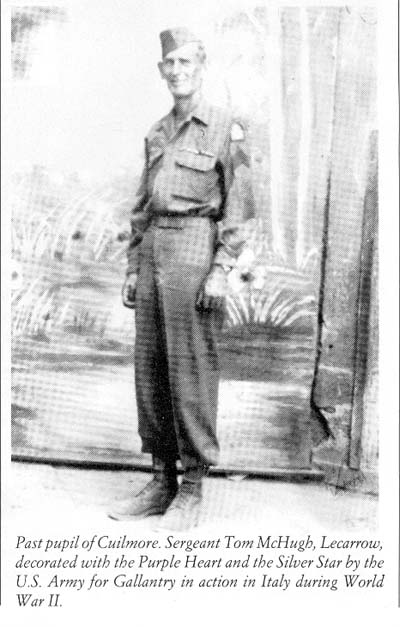
THE tide of emigration which affected rural Ireland over the last century also affected the Cuilmore area in the same sad way. In the early part of the century a bigger percentage of the emigrants went to the U.S.A. and it was not until after the Second World War that people started to emigrate in big numbers to England.
My first memories of seeing emigrants leaving the Cuilmore area was about 1958. Two older brothers of two of my classmates, one was Paddy Geraghty and the other was John Joe Monaghan. We were all watching for the hackney car which took them to the mid-day train in Westport and everybody waved goodbye as it passed. The fact that they were emigrating stays clearly in my mind.
The route to England in the forties and fifties was fairly easy, a car to the train in Westport which took them to Dublin and the boat from there to Holyhead or Liverpool, no passport was needed, only the price of your ticket. England boomed during the fifties and sixties and most of the emigrants did well, the rebuilding of England after the war was taking place and work was plentiful and the money was good which gave most people the opportunity to return home fairly regularly and normally with a lot more money then on the day they left on the mid-day train.
In the seventies a lot of the emigrants re- turned home and settled as it was one of the more prosperous decades in Ireland.
In the first half of the century emigrants had a much harder time. Their reason for emigrating was not that England or the U.S.A. had a lot to offer but that Ireland had nothing. Work was scarce and so was money.
Emigration to the U.S.A. in the twenties and thirties was substantial. Entry to the U.S. was not as easy as England. Everybody had to have a passport and somebody to claim you when you arrived at your destination. If one member of a family got established there they would be able to claim brothers, sisters, cousins and neigh- bours. They all helped each other out. Some emigrated to the U.S. through England, sailing from Liverpool or Southhampton or other English ports. Those who left from Ireland took the train from Newport and later down from Westport to Cobh and sailed to New York or Boston.
Everybody entering the U.S. on those passenger ships were listed very accurately. You would be listed as an alien passenger for the U.S. Immigration Officer at the port of arrival, giving your full name, age, sex, married or single, your calling or occupation, whether you could read or write and what language, which country were you a citizen of, what race of people you belonged to, your last permanent residence, the name and complete address of nearest relative in the country from where you came, your final destina- tion, by whom was your passage paid, were you ever in the U.S. before and where, whether you were going to join a relative or friend and their full name and complete address.

Condition of health, mental and physical, if you were deformed or crippled, your height, complexion, and colour of your eyes and hair, any marks or identification and your place of birth. All this information would be handed by the ship's captain to the Immigration Officer at the port of arrival and can be found there for every emigrant that sailed to the U.S. on those ships. Many of the people who went to the U.S. went into a very bad depression in the thirties and some of them did not get the opportunity of coming back to Ireland for a very long time, some did not return for thirty years or more.
Later on in the forties and fifties, the journey to the U.S. changed dramatically, the age of the airplane had arrived, an airport was built at Rynanna in Co. Clare and the trip across the Atlantic was reduced from seven days (travelling by sea) to seven hours (flying). This gave the local hackney cars plenty to do. Locals returning from the U.S. on holidays would be collected at Rynanna (later renamed Shannon) and brought back again for their return flight. Cuilmore had one such car (Patrick Geraghty) which did numerous runs to Shannon for such occasions, as also had Lecarrow (John Salmon).
In the last five years emigration to England has been very little as unemployment there is increasing. At the present time the U.S. has limited the number of work visas issued to emigrants and it is almost impossible to get in without one.
Hopefully in the next few years emigration will decline as it is very sad to see young people having to leave the place of their birth to earn a living.